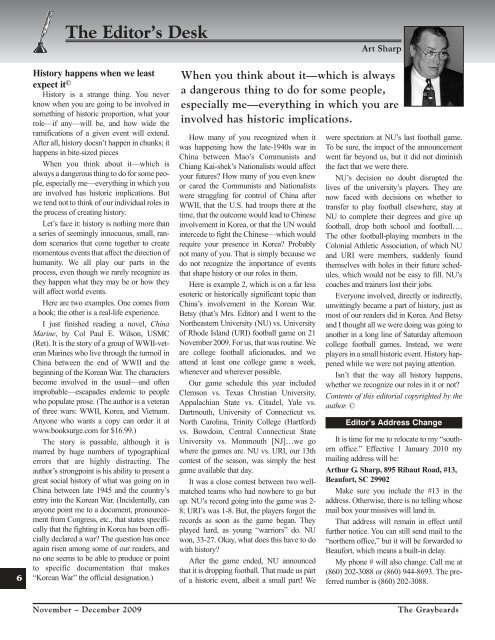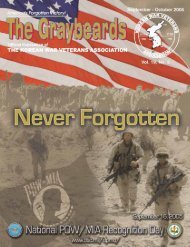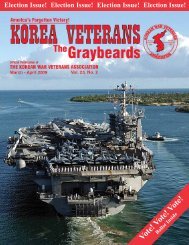gray06 Nov-Dec 2009_Gray01_Jan-Feb 2005.qxd.qxd - Korean War ...
gray06 Nov-Dec 2009_Gray01_Jan-Feb 2005.qxd.qxd - Korean War ...
gray06 Nov-Dec 2009_Gray01_Jan-Feb 2005.qxd.qxd - Korean War ...
You also want an ePaper? Increase the reach of your titles
YUMPU automatically turns print PDFs into web optimized ePapers that Google loves.
The Editor’s Desk<br />
Art Sharp<br />
6<br />
History happens when we least<br />
expect it ©<br />
History is a strange thing. You never<br />
know when you are going to be involved in<br />
something of historic proportion, what your<br />
role—if any—will be, and how wide the<br />
ramifications of a given event will extend.<br />
After all, history doesn’t happen in chunks; it<br />
happens in bite-sized pieces<br />
When you think about it—which is<br />
always a dangerous thing to do for some people,<br />
especially me—everything in which you<br />
are involved has historic implications. But<br />
we tend not to think of our individual roles in<br />
the process of creating history.<br />
Let’s face it: history is nothing more than<br />
a series of seemingly innocuous, small, random<br />
scenarios that come together to create<br />
momentous events that affect the direction of<br />
humanity. We all play our parts in the<br />
process, even though we rarely recognize as<br />
they happen what they may be or how they<br />
will affect world events.<br />
Here are two examples. One comes from<br />
a book; the other is a real-life experience.<br />
I just finished reading a novel, China<br />
Marine, by Col Paul E. Wilson, USMC<br />
(Ret). It is the story of a group of WWII-veteran<br />
Marines who live through the turmoil in<br />
China between the end of WWII and the<br />
beginning of the <strong>Korean</strong> <strong>War</strong>. The characters<br />
become involved in the usual—and often<br />
improbable—escapades endemic to people<br />
who populate prose. (The author is a veteran<br />
of three wars: WWII, Korea, and Vietnam.<br />
Anyone who wants a copy can order it at<br />
www.booksurge.com for $16.99.)<br />
The story is passable, although it is<br />
marred by huge numbers of typographical<br />
errors that are highly distracting. The<br />
author’s strongpoint is his ability to present a<br />
great social history of what was going on in<br />
China between late 1945 and the country’s<br />
entry into the <strong>Korean</strong> <strong>War</strong>. (Incidentally, can<br />
anyone point me to a document, pronouncement<br />
from Congress, etc., that states specifically<br />
that the fighting in Korea has been officially<br />
declared a war? The question has once<br />
again risen among some of our readers, and<br />
no one seems to be able to produce or point<br />
to specific documentation that makes<br />
“<strong>Korean</strong> <strong>War</strong>” the official designation.)<br />
When you think about it—which is always<br />
a dangerous thing to do for some people,<br />
especially me—everything in which you are<br />
involved has historic implications.<br />
How many of you recognized when it<br />
was happening how the late-1940s war in<br />
China between Mao’s Communists and<br />
Chiang Kai-shek’s Nationalists would affect<br />
your futures? How many of you even knew<br />
or cared the Communists and Nationalists<br />
were struggling for control of China after<br />
WWII, that the U.S. had troops there at the<br />
time, that the outcome would lead to Chinese<br />
involvement in Korea, or that the UN would<br />
intercede to fight the Chinese—which would<br />
require your presence in Korea? Probably<br />
not many of you. That is simply because we<br />
do not recognize the importance of events<br />
that shape history or our roles in them.<br />
Here is example 2, which is on a far less<br />
esoteric or historically significant topic than<br />
China’s involvement in the <strong>Korean</strong> <strong>War</strong>.<br />
Betsy (that’s Mrs. Editor) and I went to the<br />
Northeastern University (NU) vs. University<br />
of Rhode Island (URI) football game on 21<br />
<strong>Nov</strong>ember <strong>2009</strong>. For us, that was routine. We<br />
are college football aficionados, and we<br />
attend at least one college game a week,<br />
whenever and wherever possible.<br />
Our game schedule this year included<br />
Clemson vs. Texas Christian University,<br />
Appalachian State vs. Citadel, Yale vs.<br />
Dartmouth, University of Connecticut vs.<br />
North Carolina, Trinity College (Hartford)<br />
vs. Bowdoin, Central Connecticut State<br />
University vs. Monmouth [NJ]…we go<br />
where the games are. NU vs. URI, our 13th<br />
contest of the season, was simply the best<br />
game available that day.<br />
It was a close contest between two wellmatched<br />
teams who had nowhere to go but<br />
up. NU’s record going into the game was 2-<br />
8; URI’s was 1-8. But, the players forgot the<br />
records as soon as the game began. They<br />
played hard, as young “warriors” do. NU<br />
won, 33-27. Okay, what does this have to do<br />
with history?<br />
After the game ended, NU announced<br />
that it is dropping football. That made us part<br />
of a historic event, albeit a small part! We<br />
were spectators at NU’s last football game.<br />
To be sure, the impact of the announcement<br />
went far beyond us, but it did not diminish<br />
the fact that we were there.<br />
NU’s decision no doubt disrupted the<br />
lives of the university’s players. They are<br />
now faced with decisions on whether to<br />
transfer to play football elsewhere, stay at<br />
NU to complete their degrees and give up<br />
football, drop both school and football….<br />
The other football-playing members in the<br />
Colonial Athletic Association, of which NU<br />
and URI were members, suddenly found<br />
themselves with holes in their future schedules,<br />
which would not be easy to fill. NU’s<br />
coaches and trainers lost their jobs.<br />
Everyone involved, directly or indirectly,<br />
unwittingly became a part of history, just as<br />
most of our readers did in Korea. And Betsy<br />
and I thought all we were doing was going to<br />
another in a long line of Saturday afternoon<br />
college football games. Instead, we were<br />
players in a small historic event. History happened<br />
while we were not paying attention.<br />
Isn’t that the way all history happens,<br />
whether we recognize our roles in it or not?<br />
Contents of this editorial copyrighted by the<br />
author. ©<br />
Editor’s Address Change<br />
It is time for me to relocate to my “southern<br />
office.” Effective 1 <strong>Jan</strong>uary 2010 my<br />
mailing address will be:<br />
Arthur G. Sharp, 895 Ribaut Road, #13,<br />
Beaufort, SC 29902<br />
Make sure you include the #13 in the<br />
address. Otherwise, there is no telling whose<br />
mail box your missives will land in.<br />
That address will remain in effect until<br />
further notice. You can still send mail to the<br />
“northern office,” but it will be forwarded to<br />
Beaufort, which means a built-in delay.<br />
My phone # will also change. Call me at<br />
(860) 202-3088 or (860) 944-8693. The preferred<br />
number is (860) 202-3088.<br />
<strong>Nov</strong>ember – <strong>Dec</strong>ember <strong>2009</strong><br />
The Graybeards

















